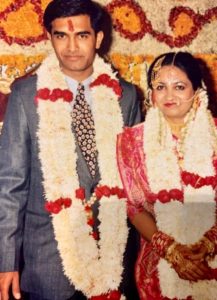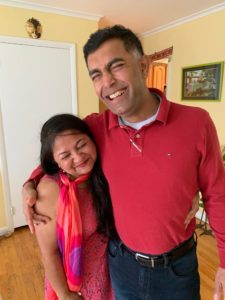My husband and I recently celebrated our 25th wedding anniversary — with multiple parties in multiple places. It seemed fitting, given that for the first half of our marriage, we never lived in one apartment or house for more than two years! Through periods of relocating together or living separately, across continents and states, trading off on who played the role of the trailing spouse, we’ve had to lean on significant parental support, maintain two households, and spend a sizable sum on commuting and phone bills.
We’ve explored many parts of the world together and made wonderful friends along the way, but this lifestyle caused a lot of wear and tear — including on our firstborn, who had to deal with the weekday absence of one parent for his entire third grade school year.
Like many trailing spouses, I’ve felt the clawing pain of social isolation, the sinking feeling of having to restart my career from scratch, the turbulence from not knowing where and when I’d have to set up my next home, and the uneasiness of uncertainty. On the flip side, I’ve also felt the guilt and pressure of being the spouse who prompted my family to move for the sake of my career advancement. Again and again, I’ve learned how to reinvent myself so I could fit in with new sets of people and places.
Why did my husband and I put ourselves through this? Was it all worth it? Upon reflection, we think so, because we believe that a successful marriage means both parties are happy, or at least in equilibrium. For our careers, this has meant either trying to have it both ways (at the expense of living together full-time) or taking turns (at the expense of one spouse’s career momentum).
In the Beginning…

My trailing spouse journey began in the mid-1990s, just two years into married life. One fine evening, my husband, then a management consultant, sauntered into our New Delhi home and casually asked if I wanted to move to New York, where he had been offered a new job. “Yes, sure,” I said reflexively, fondly recalling the summer I had spent working as a camp counselor in Vermont, and the subsequent trip to Manhattan that had thrilled my 19-year-old brain.
Despite my eagerness, this first relocation was not perfect; I would rank it as a 11/15 on the Gupte Scale. I was only halfway through my doctorate at the School of International Studies at the top-ranked Jawaharlal Nehru University (JNU) in Delhi; I also had a full-time job as an on-air reporter for BBC World’s India Business Report. On top of that, I wasn’t thrilled that I’d be following my husband on a spouse visa, which would not allow me to work. I had been working at a radio station and writing freelance pieces for national Indian newspapers since I was a teenager; the thought of being forcibly unemployed was unpalatable and unacceptable. Still, we were so young at the time, barely in our mid-20s. We had relatively little to lose; we hadn’t yet bought a house or had children whose needs we’d have to take into account. It seemed like we had the energy and flexibility to give this a try.
My husband left for the United States and I moved back in with my parents. For 18 months, I filled my days with studying, working, and crying each time I had to leave for the airport (be it in Delhi or New York). Finally, I earned my doctorate, quit my job and officially moved to New York. At the time, I was six months pregnant with our first child.
I immediately loved New York and all it had to offer: Central Park, museums, grocery stores open past midnight, unparalleled electric energy. Initially, we lived in a Manhattan studio apartment, walking distance from my husband’s office and many top tourist attractions. After that first year, we moved to Roosevelt Island, a neighborhood just one subway stop away from midtown that nevertheless offered more space and a much slower pace for our young family.
Finding Community
During this global transition, social isolation was my toughest challenge. I enjoy having a large circle of people to tap into for intellectual stimulation, but since I was neither studying nor working for the first time in my life, there seemed to be no easy way to make friends. My husband was at work, we didn’t have any existing friends or family nearby and the time difference/existing technology made it difficult to communicate with the ones back home; social media was still in its infancy so I didn’t even have a virtual community to lean on.
This, I believe, is my least favorite part of being a trailing spouse: the lack of connection with the new world around us. Once this hurdle has been crossed, everything looks and feels way better. The first big step for me was joining a Mother & Baby group in my neighborhood, after the birth of my son. This gave me a community of fellow first-time moms who understood the problems of being stuck with a wailing baby while our spouses went off to work, the unexpected challenges of breastfeeding and extreme sleep-deprivation and loads of laundry!
The next big step I took was deciding to go back to school for a second master’s degree, even though I had just wrapped up a doctorate. I knew I wanted to continue being a journalist and the quickest way to enter the market in the U.S. seemed to be to get a coveted degree in New York. This also gave me something to look forward to other than burping and spit-up! I was accepted into Columbia University’s Graduate School of Journalism in 2001, when my son was a toddler. As we were debating different childcare options, my mother offered to take a sabbatical from her teaching job in Delhi to help out; we jumped at her generous offer, although it meant she would be living across the world from my father, similar to what I had recently experienced as a newlywed.

Once my social life picked up and I was more intellectually engaged, I felt happy about my altered circumstances. I was constructing something new and different a few thousand miles away from what had been mine. I was replacing uncertainty with a fresh scaffolding with which to build an alternate life. I was gaining confidence, knowing I could do this in a new setting.
Ultimately, I emerged a more evolved person: still technically a trailing spouse, but one who could forge ahead as needed under trying circumstances. This first major move prepared me for many other life changes, including a career transition and juggling my work-life balance with two children.
But along the way, there was a second major and even more disconcerting trailing spouse experience to come: a driving-distance move that seemed easier, but turned out to be even more challenging than my move across the world. For the next chapter of my story, read Round 2…

